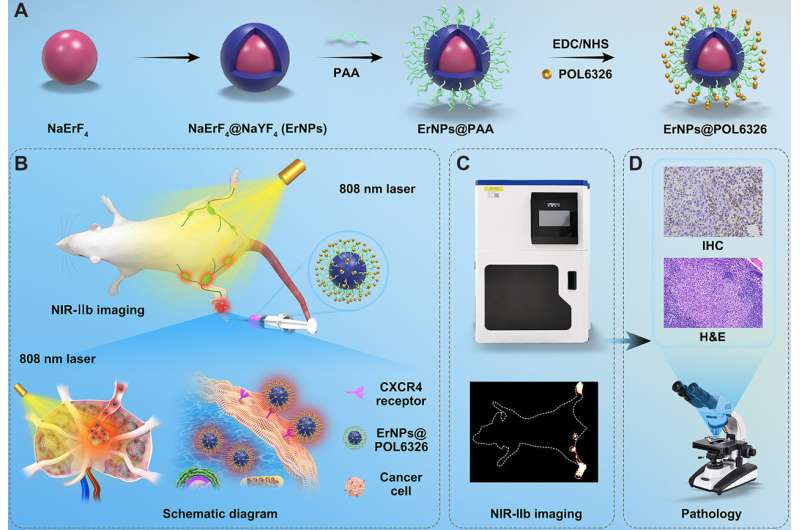Sentinel lymph node (SLN) is the first lymph node draining from a tumor, and sentinel lymph node biopsy (SLNB) for breast cancer is the standard procedure for clinically node-negative (cN0) early-stage breast cancer. Currently, the commonly used tracers in clinical practice can only trace SLNs without evaluating their metastatic status.
Therefore, intraoperative rapid frozen pathology is still required to diagnose whether metastasis exists in SLNs. However, studies have shown that 70% of cN0 breast cancer patients also exhibit negative SLNB pathological results, and these patients can completely avoid SLNB, thereby reducing the occurrence of complications, improving the quality of life.
In a study published in Cancer Research, the research group led by Prof. Zhang Yun from the Fujian Institute of Research on the Structure of Matter of the Chinese Academy of Sciences developed a novel near-infrared (NIR)-IIb nanoprobe ErNPs@POL6326 for in vivo real-time detection of SLN metastasis of breast cancer.
The researchers synthesized the novel ErNPs@POL6326 nanoprobe by using erbium ion-doped nanoprobes (ErNPs) covalently conjugated with tumor-specific target CXCR4 antagonist peptide Balixafortide (POL6326).
Compared with indocyanine green commonly used in clinical practice, ErNPs@POL6326 exhibits excellent photostability and photobleaching resistance, with higher resolution and deeper penetration depth. Meanwhile, ErNPs@POL6326 has been shown to come with excellent biocompatibility and no obvious toxic or side effects at the cellular and animal levels.
In addition, the researchers demonstrated the highly specific tumor targeting ability of the ErNPs@POL6326 probes for breast cancer cell lines and SLN metastasis tumor model mice with high expression of CXCR4. It could accurately identify metastatic lymph nodes in real-time in a syngeneic mouse mammary tumor model and a human breast cancer xenograft model, with a sensitivity of 92.86% and 93.33%, as well as a specificity of 96.15% and 96.08%, respectively.


